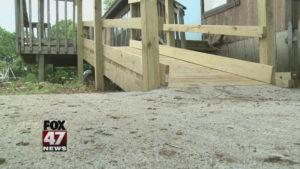Accessibility
When Does Regulation Go Too Far (Or Not Far Enough)?
 In Ridgefield, Connecticut residents were furious to find that the wheelchair ramp at their local CVS Pharmacy has been removed and replaced with stairs. Wheelchair and stroller users now must use the far side of the store to gain access. People are outraged and encouraging the ramp to be put back where it originally was placed.
In Ridgefield, Connecticut residents were furious to find that the wheelchair ramp at their local CVS Pharmacy has been removed and replaced with stairs. Wheelchair and stroller users now must use the far side of the store to gain access. People are outraged and encouraging the ramp to be put back where it originally was placed.
In public places ADA rules are meant to be enforced.
CVS corporate was not part of the decision to have the ramp removed. The town of Ridgefield claims to have “no jurisdiction over the privately owned property”. This is contrary to what the ADA (Americans with Disabilities Act) says.
(view full story: http://bit.ly/237zCUg)
On the other end of the spectrum…
 In Lansing, Michigan a family who had a temporary ramp built for their 4 year old son is being told they need to take it down because it is too steep for ADA regulations.The boy’s father built the ramp with a private contractor as soon as he learned that his son would be temporarily in a wheelchair after being hit by a car in May, 2016.
In Lansing, Michigan a family who had a temporary ramp built for their 4 year old son is being told they need to take it down because it is too steep for ADA regulations.The boy’s father built the ramp with a private contractor as soon as he learned that his son would be temporarily in a wheelchair after being hit by a car in May, 2016.
The building inspector and township supervisor recently viewed the ramp and it did not meet the rules as interpreted by the city officials. As a result the city condemned the ramp demanding that the homeowner obtain a building permit and rebuild the ramp.Their reasoning was was due to the father not obtaining a permit before the project began and that the ramp did not meet their ADA and state guidelines for a ramp slope. (view full story: http://bit.ly/1tsQf0F)
There are a couple of ways this could have been avoided since the 4 year old will only be in a wheelchair for a few months as he recovers. There is a clause in the ADA that allowed for what is called reasonable accommodation that takes into consideration the requirements of the situation, the space available, and the cost. Furthermore, the ADA was designed to deal with public access, not homeowners.
Homeowners have very different requirements and budgets than public buildings.
How is it that a public building does not have to meet certain requirements to assist those with disabilities, yet a private homeowner who is attempting to make accommodations for their four year old in a wheelchair are being told to have their temporary ramp condemned?
Are government regulations and compliances created to protect the well-being of residents or is it yet another form of control and service fees?


Thank you for the article on CVS in Ridgefield.
Please help our fight with transportation for all disabled and then this CVS nightmare. The town engineering team claims it to be to code but I challenge that and would like to find out from a better source.
I am in a wheelchair and this truly pisses me off.
I assure you that it’s not safe and never cleaned properly. My $70,000 wheelchair is NOT being squeezed through here and risking damage. ACCESSIBILITY was lost here.
Please continue to help in any way.
Peace
Jeff